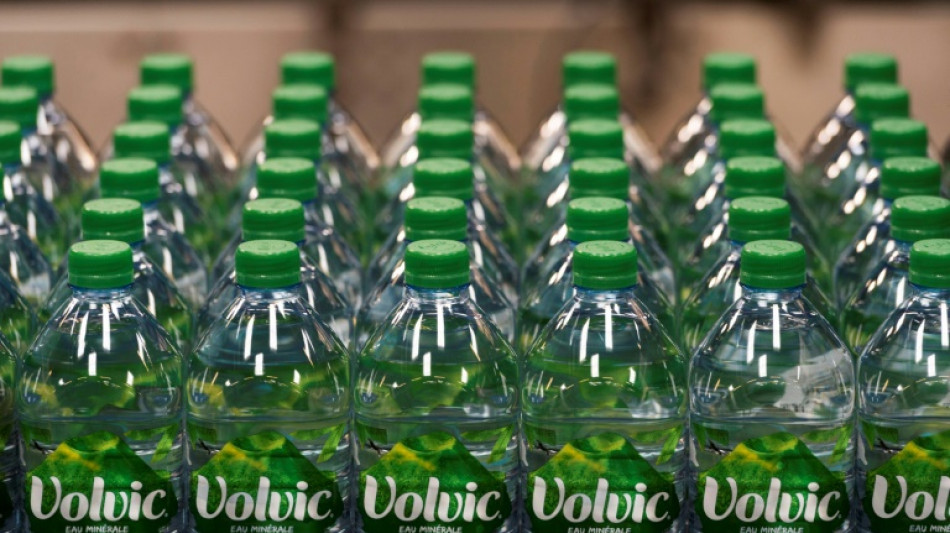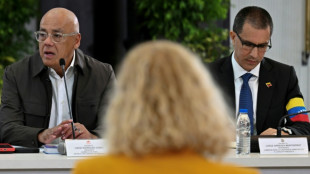
-
 NFL names 49ers to face Rams in Aussie regular-season debut
NFL names 49ers to face Rams in Aussie regular-season debut
-
Bielle-Biarrey sparkles as rampant France beat Ireland in Six Nations

-
 Flame arrives in Milan for Winter Olympics ceremony
Flame arrives in Milan for Winter Olympics ceremony
-
Olympic big air champion Su survives scare

-
 89 kidnapped Nigerian Christians released
89 kidnapped Nigerian Christians released
-
Cuba willing to talk to US, 'without pressure'

-
 Famine spreading in Sudan's Darfur, UN-backed experts warn
Famine spreading in Sudan's Darfur, UN-backed experts warn
-
2026 Winter Olympics flame arrives in Milan

-
 Congo-Brazzaville's veteran president declares re-election run
Congo-Brazzaville's veteran president declares re-election run
-
Olympic snowboard star Chloe Kim proud to represent 'diverse' USA

-
 Iran filmmaker Panahi fears Iranians' interests will be 'sacrificed' in US talks
Iran filmmaker Panahi fears Iranians' interests will be 'sacrificed' in US talks
-
Leicester at risk of relegation after six-point deduction

-
 Deadly storm sparks floods in Spain, raises calls to postpone Portugal vote
Deadly storm sparks floods in Spain, raises calls to postpone Portugal vote
-
Trump urges new nuclear treaty after Russia agreement ends

-
 'Burned in their houses': Nigerians recount horror of massacre
'Burned in their houses': Nigerians recount horror of massacre
-
Carney scraps Canada EV sales mandate, affirms auto sector's future is electric

-
 Emotional reunions, dashed hopes as Ukraine soldiers released
Emotional reunions, dashed hopes as Ukraine soldiers released
-
Bad Bunny promises to bring Puerto Rican culture to Super Bowl

-
 Venezuela amnesty bill excludes gross rights abuses under Chavez, Maduro
Venezuela amnesty bill excludes gross rights abuses under Chavez, Maduro
-
Lower pollution during Covid boosted methane: study

-
 Doping chiefs vow to look into Olympic ski jumping 'penis injection' claims
Doping chiefs vow to look into Olympic ski jumping 'penis injection' claims
-
England's Feyi-Waboso in injury scare ahead of Six Nations opener

-
 EU defends Spain after Telegram founder criticism
EU defends Spain after Telegram founder criticism
-
Novo Nordisk vows legal action to protect Wegovy pill

-
 Swiss rivalry is fun -- until Games start, says Odermatt
Swiss rivalry is fun -- until Games start, says Odermatt
-
Canadian snowboarder McMorris eyes slopestyle after crash at Olympics

-
 Deadly storm sparks floods in Spain, disrupts Portugal vote
Deadly storm sparks floods in Spain, disrupts Portugal vote
-
Ukrainian flag bearer proud to show his country is still standing

-
 Carney scraps Canada EV sales mandate
Carney scraps Canada EV sales mandate
-
Morocco says evacuated 140,000 people due to severe weather

-
 Spurs boss Frank says Romero outburst 'dealt with internally'
Spurs boss Frank says Romero outburst 'dealt with internally'
-
Giannis suitors make deals as NBA trade deadline nears

-
 Carrick stresses significance of Munich air disaster to Man Utd history
Carrick stresses significance of Munich air disaster to Man Utd history
-
Record January window for transfers despite drop in spending

-
 'Burned inside their houses': Nigerians recount horror of massacre
'Burned inside their houses': Nigerians recount horror of massacre
-
Iran, US prepare for Oman talks after deadly protest crackdown

-
 Winter Olympics opening ceremony nears as virus disrupts ice hockey
Winter Olympics opening ceremony nears as virus disrupts ice hockey
-
Mining giant Rio Tinto abandons Glencore merger bid

-
 Davos forum opens probe into CEO Brende's Epstein links
Davos forum opens probe into CEO Brende's Epstein links
-
ECB warns of stronger euro impact, holds rates

-
 Famine spreading in Sudan's Darfur, warn UN-backed experts
Famine spreading in Sudan's Darfur, warn UN-backed experts
-
Lights back on in eastern Cuba after widespread blackout

-
 Russia, US agree to resume military contacts at Ukraine talks
Russia, US agree to resume military contacts at Ukraine talks
-
Greece aims to cut queues at ancient sites with new portal

-
 No time frame to get Palmer in 'perfect' shape - Rosenior
No time frame to get Palmer in 'perfect' shape - Rosenior
-
Stocks fall as tech valuation fears stoke volatility

-
 US Olympic body backs LA28 leadership amid Wasserman scandal
US Olympic body backs LA28 leadership amid Wasserman scandal
-
Gnabry extends Bayern Munich deal until 2028

-
 England captain Stokes suffers facial injury after being hit by ball
England captain Stokes suffers facial injury after being hit by ball
-
Italy captain Lamaro amongst trio set for 50th caps against Scotland


Volvic on front line of France's new water fears
The public fountains in Volvic, the home of one of the world's most famous mineral waters, have been turned off.
Just down the road from the bottling factory at the foot of the old volcanic hills of central France, streams once powerful enough to drive flour mills are drying up and villages are under a hosepipe ban.
Campaigners such as Sylvie de Larouziere, head of the water conservation group PREVA, point the finger at the Volvic plant. "It seems like it's always getting bigger," she complained.
A local aristocratic trout farmer is suing the company, owned by French multinational Danone, after a stream that fed his 17th-century fish ponds abruptly dried up.
The Puy de Dome region is sometimes called the "water tower" of France, with heavy and reliable rainfall meaning farmers downstream used to slosh around in their fields because the soil was so wet.
But those days are long gone. In early May with supplies "abnormally weak", authorities imposed a hosepipe ban and outlawed the filling of swimming pools in 31 nearby districts, hitting some 60,000 people.
Volvic's public fountains were switched off and villagers fear water cuts this summer.
"It was a shock," said Maria-Louisa Borges, a retired cleaner who has lived in Volvic for 50 years. "We're just coming out of winter."
The restrictions, affecting somewhere so famous for its abundant water, underline the worsening strains on supplies in France and the competing demands for an increasingly rare resource.
Two-thirds of the country's water tables are below normal, Environment Minister Christophe Bechu said last week as he voiced "very serious concerns".
But it also raises questions about the future of France's enormous mineral water industry, already decried by environmentalists for the hundreds of billions of plastic bottles it produces annually.
France is both the world's biggest exporter of bottled water and the home of its most famous brands from Volvic to Evian, Vittel to Perrier.
- 'Critical state' -
For decades, experts have been warning about the risk to global fresh water supplies posed by climate change, population growth, and over-consumption.
Problems have been gathering in France, though mostly beyond the public eye. But this winter, the country went a record 32 days without rainfall, from January 21 to February 21. Even villages in the foothills of the snow-topped Pyrenees mountains are having to be supplied by truck.
The dry winter followed punishing heat last summer with months of drought and high temperatures parching even the normally lush Alps and rendering mighty rivers like the Rhine unpassable for barges.
President Emmanuel Macron said it spelled "the end of abundance".
"Climate change is adding to an already degraded situation, with long droughts, heatwaves but also winter droughts," former French environment minister and a Green MP, Delphine Batho, told AFP. "That's leading to a critical state for drinking water."
In a sign of conflicts experts anticipate in future, activists opposed to farmers building rainwater-capture facilities in Batho's constituency in western France clashed violently with security forces in March.
Two protesters were left in a coma.
- Rain shortfall? -
No blows are being traded in Volvic, but fears are growing. Similar tensions are playing out in the eastern Vosges region, where Nestle-owned Vittel is accused of over-exploiting the water table.
Other disputes between water companies and locals have occurred as far afield as Mexico, California and Fiji.
"Sending water to the other side of the world while we die of thirst here? It bothers me," said Jose da Silva, a 69-year-old who worked for 30 years at the Volvic plant.
"They try to claim it's not the same source (as for the drinking water), but I'm not convinced," he told AFP.
The Volvic brand has been around since 1935, the water naturally filtered through a granite-lined volcanic basin in a process that takes five years, according to the company.
Pumping has rocketed from around 200,000 litres a year in 1950 to 1.7 billion litres in 2020, according to its own figures.
Yet Volvic is exempt from the latest water restrictions imposed on locals. The company, however, has pledged to respect a five-percent reduction of its extraction limit of 2.8 billion litres.
Given that it is currently withdrawing less than the limit, campaigners say the pledge makes no difference.
But the company insists it only uses 22 percent of the local water, with 50 percent taken by the public water system.
"Undertaken downstream from the drinking water source, the activities of Volvic do not have an impact on the availability in the drinking water system of the area," it said in a statement.
The local government prefect's office, which sets the annual quota for Volvic, also denied any link between the company and the water restrictions.
It blamed a shortfall in rain, saying it was 24 percent below average in 2022.
The water use restrictions were "preventative and aim to reduce consumption in order to avoid bigger supply tensions", it said.
- Legal fight -
But PREVA and another local group, Marsat, suspect the six deep wells used by Danone are drawing down the level of Volvic's aquifer.
Trout farmer Edouard de Feligonde has spent four years suing the French state for 32 million euros ($35 million) and taking Volvic to court to recover losses caused by his water source drying up.
He is confident an expert report ordered by a judge last year will validate his findings that show Danone is to blame.
"At the moment, authorities are trying to make us believe that the water shortages are linked to the general problem of drought. It's false," he told AFP.
He said many people are scared to speak out as Danone is by far the biggest local employer, with about 1,000 people on its payroll.
"I'm not the only one affected, but I'm the only one to have the means to fight back," he said.
M.Qasim--SF-PST




